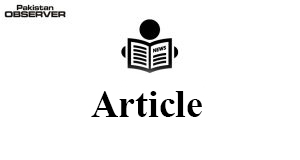Hunain Mahmood
WHEN the people of Kashmir were observing Ashoura and running traditional peaceful processions to commemorate the martyrdom of Imam Hussain, the grandson of Prophet Muhammad; Indian security forces opened fire on the protesters and according to the local media reports, around 250 people were seriously injured. This incident caused an international uproar such as the New York Times published a long report against the use of pellet guns in Kashmir and its impact on the victims. A US-based organization, Human Rights Watch urged the government of India to stop using Pellet-Firing Shotguns in Kashmir to disperse the protesting crowds.
Indian security forces first used this lethal weapon in 2010, claiming it ‘non-lethal’. A Srinagar-based leading Human Rights defender, Khurram Pervaiz confirmed that eye injuries due to pellet guns are 1500 plus while the other physical injuries caused by the pellets are close to 10,000 so far. Most of the affected people lost their eyesight and a significant number of people became handicapped. Meenaksi Ganguly, the South Asian director at Human Rights Watch said on September 4: “Indian authorities need to recognize that this weapon fired into crowds, even with violent demonstrators, will invariably cause indiscriminate and excessive injury in violation of international standards.”
The United Nations Basic Principles on the Use of Force and Firearms “prohibit the use of those firearms and ammunition that cause unwarranted injury or present an unwarranted risk.” The 2020 UN guidance on “less-lethal weapons” in law enforcement says, “Multiple projectiles fired at the same time are inaccurate and, in general, their use cannot comply with the principles of necessity and proportionality. Metal pellets, such as those fired from shotguns, should never be used.” HRW report remarks, “Indian leaders who claim that their policies are improving the lives of Kashmiris cannot disregard that security forces are maiming, blinding, and killing people,” Ganguly said, “The Indian government should cease the use of shotguns firing metal pellets and review its crowd control techniques to meet international standards.” Apart from HRW, Amnesty International also asked the Indian Government to stop using the pellet guns immediately and also to ensure that any other weapon used should match the international human right standards on the use of force.
The use of pellet guns in Jammu Kashmir has left many people blind and injured, and the most tragic fact is that even the children were not spared. The future of these people has been destroyed. The children are hopeless as they are unable to continue their education or even do their daily chores. The forces are accused of aiming directly at the eyes of the protestors. The victims now require special treatment and medical facilities which are not available there. The people of Jammu and Kashmir are also suffering due to months-long lockdown and communication blackout since 5th August, 2019. Due to the Covid-19 lockdown and repeated curfews, regular medical check-ups are also proving to be difficult for people. People are also being suppressed through fake encounters and operations only to inflict punishment and cause pain.
A study, titled, ‘Psychiatric Morbidity in Pellet Injury Victims of Kashmir’ conducted by The Department of Psychiatry of Government Medical College (GMC), Srinagar, that “85percent of 380 pellet victims examined during this post-2016 uprising period were found to be suffering from various psychiatric disorders.” The study revealed that depression was the most common psychological disorder diagnosed in the victims (25.79percent), followed by Adjustment disorder (15.79percent), Post-Traumatic Stress Disorder (9.21percent) and Anxiety disorders (9percent).
During the last decade, hundreds of reports and heartbreaking stories have been published in international media, tarnishing badly the image of India and tainting its democratic credentials which were once India’s major source of strength. Although many organisations condemn the use of pellet guns, yet the Indian security forces continue to use them. The United Nations Security Council should impose a ban on the use of pellet guns as they are lethal weapons and cause fatal injuries. Those countries using pellet guns must not walk free and should be held accountable internationally.
Pakistan, being the lone supporter of the Kashmir cause, should raise voice at the international forums regarding unabated use of pellet guns against the innocent protesters including the bystanders. Given a large number of victims, Pakistan should also urge the Organization of Islamic Cooperation (OIC) to establish a pellet victim fund to rehabilitate them. Besides, Prime Minister Imran Khan must raise this issue while speaking at the UNGA in the last week of this month.
—The writer is based in Islamabad.










